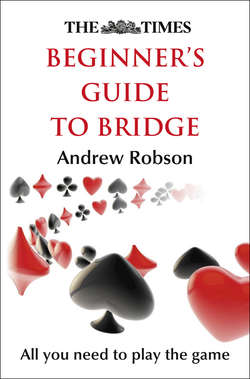The Times Beginner’s Guide to Bridge

Реклама. ООО «ЛитРес», ИНН: 7719571260.
Оглавление
Andrew Robson. The Times Beginner’s Guide to Bridge
Dedication
Contents
Introduction. Welcome to bridge
First steps
A short history
1 Appetiser
The mechanics
Cards and ranking
Drawing for partners and dealer
Shuffling and dealing etiquette
A trick
A trump
Overtrumping
Your 13 cards – your ‘hand’
Counting points
Making tricks
Counting tricks
Which order to take (‘cash’) the tricks
Extra tricks by force
Extra tricks by length
Trumping
Drawing trumps
Counting trumps
Introducing the bidding
Opening the bidding
After the bidding has opened
After the bidding has ended
After the play
2 Basics
Bidding
Balanced or unbalanced hand?
Opening with a balanced hand
Opening with an unbalanced hand
Finding a fit (making a suit trumps)
Bidding to a game contract
When to go for game
Responding to a 1NT opener
Responding to a suit opener
Bidding after an opponent’s opener
Overcalling
Doubling
Play
Playing our first deal in no-trumps
Defending
Opening lead
Defending against no-trumps
Defending against trumps
After the lead
Three basic deals
3 Core
More on bidding
Opening the bidding
Which suit to open?
Opener’s rebid
Responding to a 1NT opener
Which zone?
Part-score
Part-score/game
Game
Rebid by 1NT opener
Responding to a suit opener
Responder’s support line
Responding without a fit
The Rule of 14
The ‘dustbin’ 1NT
After the ‘dustbin’ 1NT response
More on overcalling
Suit Quality Overcall Test (SQOT)
Supporting an overcall
Overcalling no-trumps
Fulfilling your contract
Tricks without using trumps
Cashing tricks in the right order
By force
By length
By position (the ‘finesse’)
Tricks with trumps
Counting trumps and the Rule of One
When to draw trumps
More on defence
Opening lead
Defending against no-trumps
Picking the suit
Picking the card
Defending against trumps
Picking the suit
Picking the card
Defence issues
Interpreting your partner’s lead
Switching
A typical trick
Second player plays low
Third player plays high
Signalling
Discarding
Ten core deals
4 Development
Double
Two types of double
Take-out double
Responding to a take-out double
Responding to opener – cancelling the double
Take-out or penalty?
Low-level penalty doubles
High level penalty doubles
Doubles of no-trumps
Redouble
Bidding a slam
Grand slams and small slams
Bidding slam in no-trumps
Bidding slams in trump suits
The Blackwood convention
When to use ‘Blackwood’
When not to use Blackwood
4NT: the two meanings
Opening above the One level
Opening 2NT
Responding to 2NT
Opening 2♦, 2♥, 2♠
Responding to 2♦, 2♥, 2♠
Pre-emptive bidding
Opening at the Three level
Responding to Three-level openers
Opening at the Four level
Pre-empting after opponent’s opener
What to do if your opponents pre-empt
The Opening 2♣convention
When to use 2♣
Responding to 2♣
The Stayman convention
Why use Stayman?
When to use Stayman
‘Phoney Stayman’
Opener’s continuations
Bidding review
Opening the bidding
Responding to One-of-a-suit
Opener’s rebid
After hearing support
After hearing a change of suit
Opener’s rebid strategy – according to shape
Opener is balanced
Opener is one-suited: 6322, 6331
Opener is two-suited: 5431, 5422, 5521
Opener is both one-suited and two-suited: 6421, 6430
Opener is three-suited: 4441
Responder’s rebid
Opener rebid no-trumps
Opener supported responder’s suit
Opener repeated his suit
Opener bid a third suit
Coping with opposing intervention
Understanding contested auctions
Evaluating a bridge hand
Assessing your hand
Listening to the bidding
Ten developing deals
Being a good partner
Good partnership guidelines
5 Scoring and systems
How to score bridge
Objective
The score-pad
The scores
Game
Undertricks
Overtricks
Winning the rubber
Scoring doubles
Doubled undertricks
Doubled contracts that make
Redoubled contracts
Scoring slams
Scoring honours
Bridge types and systems
Chicago (‘Four-Deal’) Bridge
Duplicate Bridge
Minibridge
Bridge systems
Further bridge resources. Websites
Apps
Software
Specialist outlets
Books
Magazines
Glossary
Index
About the Author
About the Publisher
Отрывок из книги
To my mother and father, who got me started.
Andrew Robson, 2015
.....
• how many tricks need to be made by the side who has bid highest and therefore won the contract; and, by deduction, how many tricks their opponents need in order to stop them from winning;
• which player within the highest bidding partnership is the declarer, and which is the dummy.
.....